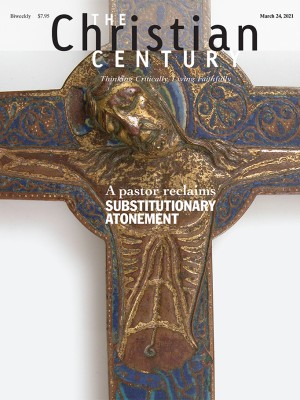I never met my maternal grandmother, Elsa Huesemann Schumacher. She collapsed over a bowl of soup at her kitchen table in Louisville, Kentucky, on September 14, 1936, and died on the spot at age 40. Elsa’s husband, a Lutheran pastor, struggled to get beyond the crippling grief that her death triggered in him. His behavior ended up significantly impacting the childhood of my mother, eight years old at the time, who became unavoidably entangled in her father’s sorrow.
Every Sunday afternoon for years, my mother’s father would make her—that was her verb—accompany him to Cave Hill Cemetery to visit the grave. He would don his black overcoat and fedora and, with his young daughter in tow, go to pay respect. This weekly ritual cast such a pall over my mother’s young life that it essentially blocked every other memory of her childhood. She never spoke about another feature of her upbringing. Since her own death 40 years ago, my siblings and I have been left to guess at what else constituted childhood for her.
Read our latest issue or browse back issues.
Resurrection may have been the last thing on my grandfather’s mind as he trudged to the cemetery each week. I sometimes wonder what shape his Easter preaching must have taken during those sorrow-filled years. Something in me wishes that a gravedigger would have walked up to him one Sunday at Cave Hill, interrupted his mourning, and said straight to his face, You know, you really need to go and do something else with your Sundays. Good years are still ahead of you and your daughter. Go and make something of your life that’s not going to happen here. I’ll take care of the grave.
When, in Mark’s telling, Mary, Mary, and Salome pay a visit to Jesus’ burial site, there’s no indication that any of them are thinking resurrection. It may be the last thing on their minds, having just witnessed the tragic event of Jesus’ execution. When they poke their heads inside the tomb to try to glimpse the corpse, a young man in a white robe—might he have doubled as a gravedigger?—interrupts their grief to say, I know you’re here for Jesus of Nazareth. But he’s not here. You need to go and do something with your grief. There’s a good life out there in front of you. Go now and tell some others what I’m telling you: Jesus has been raised, and he is a good bit ahead of you. He’s gone on to Galilee. That’s where you can catch up with him.
During the pandemic, I’ve watched families linger at grave sites much longer than usual, not sure what to do when the committal liturgy is over. Because of COVID, the church doesn’t serve funeral luncheons. Mourners can’t gather comfortably in a restaurant. Nobody in the bunch seems to have a house big enough for a group of 20 to be socially distanced from one another. So they stand there in the cold for the longest time, with the longest faces, saying very little and unsure of where to go next.
There’s no gravedigger in sight, and it’s absurd to think he would say anything if he were. But I wish someone in a white robe would show up to surprise such mourners with words like these: Folks, I know you’re all thinking about what you no longer have. But be mindful of the future. There’s good stuff ahead. You’re probably wondering if there even is a future without your mom. Well, the good news is that there is, and you can step into that future with confident hope. It happens to be where you’ll spend the rest of your life, by the way. And if you want to know a secret, this Jesus (whom I think you know something about) is already in that future, just waiting for you to notice and catch up.
Easter is an ideal day for us to shake off nostalgic notions of faith and get serious about God’s confidence in the future. One of our most unfortunate mistakes is to view the Bible mostly as a book about the past. It certainly contains an ancient record, but its direction is forward, not backward. We like to look backward, probably because retrieving or preserving the past feels more manageable than discerning an unknown future. We’re drawn to the rearview mirror, the scrapbooks of faith, the trudge to the cemetery, the warm sentiments of childhood church. Yet the God of scripture is always out ahead of us, leading into the future.
When Moses asks God to self-identify and provide a name, Christian Bibles like to translate God’s response as, “I am who I am.” But the Hebrew verb is not present tense. “I will be what I will be” is God’s way of saying, “My name is future tense.” Paul gets this forward-looking idea when describing his own life as “forgetting what lies behind and straining forward to what lies ahead.” Jesus tells his followers to keep a hand to the plow and not look back. The man at the tomb tells the mourning women that Christ is ahead of them, not just stuck in their memories.
I like to imagine how different life would be if before every appointment, every phone call, and every destination we could recognize that we have been anticipated. That the risen Christ showed up and set things in motion prior to our arrival. To live with that kind of perspective would be nothing less than Easter faith at its best.







